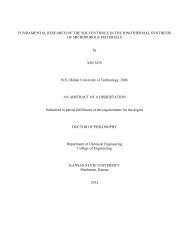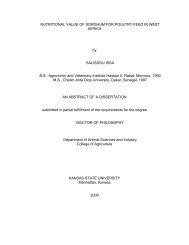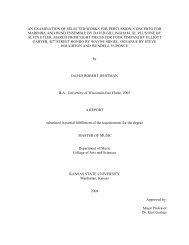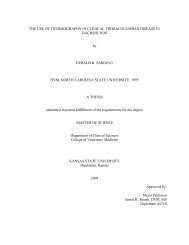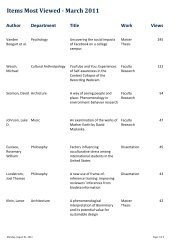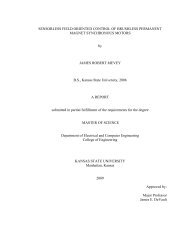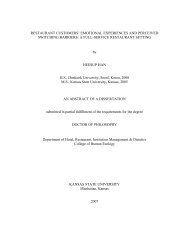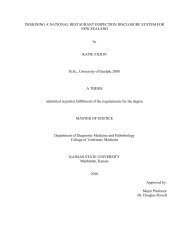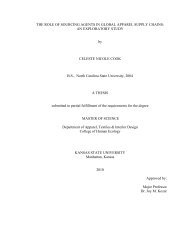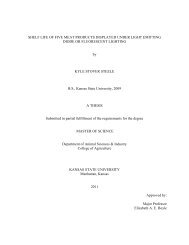exploring brand personality congruence - K-REx - Kansas State ...
exploring brand personality congruence - K-REx - Kansas State ...
exploring brand personality congruence - K-REx - Kansas State ...
Create successful ePaper yourself
Turn your PDF publications into a flip-book with our unique Google optimized e-Paper software.
loyalty towards a <strong>brand</strong> is based on the information that one has access to about the <strong>brand</strong>.<br />
This can be a function of the <strong>brand</strong>’s image, product/service performance in the market, or a<br />
similar measure (i.e. “This restaurant chain is superior to other casual dining restaurants in its<br />
class”). Affective loyalty deals with the customer’s emotional like or dislike toward the<br />
<strong>brand</strong>, which is mostly attributed to past experience (i.e. “I have grown to like this restaurant<br />
chain more so than other casual dining restaurant chains”). Conative loyalty deals with<br />
behavioral intention, the customer’s desire to continue the <strong>brand</strong> relationship through<br />
continued patronage and positive word of mouth (i.e. “I intend to continue dining at this<br />
restaurant chain in the future”). In addition, Oliver (1997) and Yi and La (2004) also cited<br />
action loyalty, which refers to the transformation of the customer’s motivated intention into a<br />
readiness to act (i.e. “When I have a need to go to a casual dining restaurant, I dine only at<br />
this restaurant”).<br />
As more choices appear in the casual dining market, coupled with the rising<br />
propensity to eat meals away from home, capturing a truly loyal customer base is paramount.<br />
Because the market is continually growing and becoming more saturated, any individual<br />
restaurant <strong>brand</strong> may have difficulty in expanding that base of loyal customers. However, it<br />
is important to note that a small but deeply loyal base can still have a substantial contribution<br />
to the <strong>brand</strong>’s equity (Aaker , 2000).<br />
Hypotheses Development and Conceptual Framework<br />
Brand Personality Congruence<br />
Although the development of the <strong>brand</strong> <strong>personality</strong> <strong>congruence</strong> scale is exploratory in<br />
nature, it brings together two important areas of research that have been shown to be useful<br />
in business and marketing applications: <strong>brand</strong> <strong>personality</strong> and <strong>congruence</strong>. Moreover,<br />
marketing professionals will be provided information that may be useful in designing<br />
marketing strategies to maximize the leverage that a well established <strong>brand</strong> <strong>personality</strong><br />
provides. When the personalities of the <strong>brand</strong> and the customer are congruent, the chances of<br />
a <strong>brand</strong> to succeed increase markedly (Temporal, 2001). Strong <strong>brand</strong> loyalty, trust, and<br />
high overall satisfaction contribute to competitive advantage, and thus warrants the need to<br />
study <strong>brand</strong> <strong>personality</strong> <strong>congruence</strong> as it relates to these constructs.<br />
18



